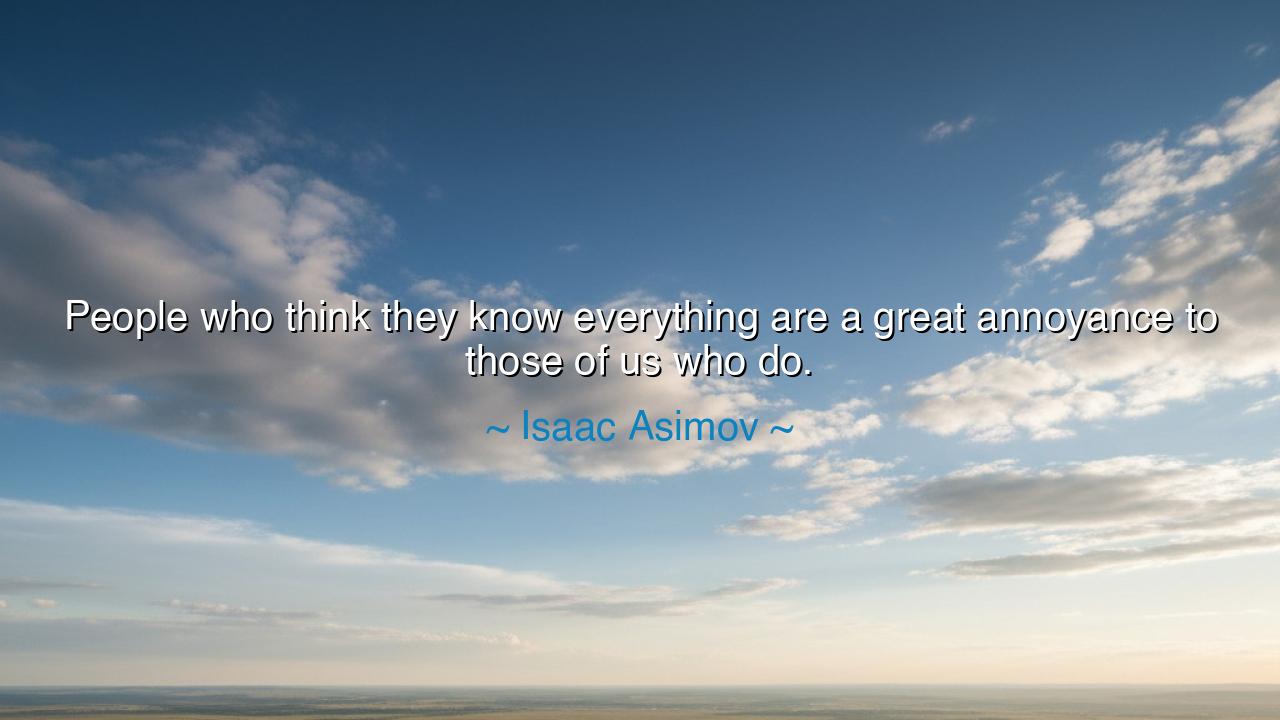
People who think they know everything are a great annoyance to






"People who think they know everything are a great annoyance to those of us who do." – Isaac Asimov
In the vast halls of knowledge, where the pursuit of truth has driven the greatest minds throughout history, there is a certain humility that must accompany the seeker. Isaac Asimov, a titan of science fiction and knowledge, in his usual sharp wit, speaks to the arrogance of those who believe that knowledge is a possession, a static thing that can be wholly grasped. This folly, he warns, not only blinds them to the truth, but it also becomes a burden to those who walk the path of true understanding. For it is knowledge that is a river, ever flowing, ever changing—not a stagnant pool to be captured and contained.
The ancients, whose lives were devoted to the search for wisdom, knew that the path of learning was long and fraught with peril. Socrates, the great philosopher, declared that the only thing he knew for certain was that he knew nothing. This was not the voice of one who lacked knowledge, but of one who understood that true wisdom begins in the acknowledgment of ignorance. The more one learns, the more one realizes how little one knows. In contrast, those who claim to have mastered all knowledge place themselves above this humble recognition and in doing so, limit their ability to truly understand.
The humble philosopher was not alone in his understanding. Leonardo da Vinci, a man of great intellect and creativity, never stopped questioning the world around him. His notebooks, filled with sketches, ideas, and endless curiosity, reveal a mind that was constantly seeking and never satisfied with easy answers. To him, knowledge was a journey, and every step forward opened up more questions. Da Vinci would have found much to ponder in Asimov’s words, for those who claim to know everything are, in essence, rejecting the endless pursuit of truth that he held so dear.
In the world of science, those who think they know everything often cause the greatest hindrance to progress. The history of science is filled with rigid minds, who, believing themselves to be in possession of complete knowledge, resisted new ideas. Galileo, whose discoveries changed the course of astronomy, faced fierce opposition from those who held to the ancient beliefs of the Earth at the center of the universe. His opponents, certain of their own wisdom, could not entertain the notion that the world might not revolve around them. It is this dogmatic certainty that Asimov warns against—the very thing that stifles progress and evolves knowledge into stagnation.
But even within the realm of knowledge, there is a danger in thinking that one can grasp all. The more wise and learned one becomes, the more one must acknowledge the vastness of what lies beyond their reach. Einstein, one of the greatest minds to ever live, spoke of the mystery of the universe in terms that were both profound and humble. He knew that his equations and theories were but glimpses of a greater truth—truths that were beyond the capacity of even the greatest minds to fully comprehend. This, in itself, is the lesson that Asimov’s words teach us: knowledge is not a destination, but a journey, one that requires humility and constant questioning.
As we move through the world, we must carry with us the wisdom of the ancients and the lessons of the great thinkers who have gone before us. Let us never fall prey to the temptation of thinking we know everything. Knowledge is vast, and wisdom lies not in the certainty of one's conclusions, but in the openness to new ideas, new perspectives, and new ways of thinking. When we encounter those who are certain of their own knowledge, let us remind ourselves that it is humility that allows for growth, and that true wisdom is always accompanied by the understanding that there is much more to learn.
The lesson here is simple: do not be fooled by the arrogance of certainty, and do not seek to be an expert in everything. Instead, embrace the path of lifelong learning, where knowledge is never fully possessed, but continually sought. Recognize the value of being both a student and a teacher, for only in this balance will we truly understand the breadth of truth and the infinite nature of wisdom. In the words of Asimov, let us understand that to think we know everything is to stop the very process of learning, and it is in humility that we can grow and truly know.






AAdministratorAdministrator
Welcome, honored guests. Please leave a comment, we will respond soon